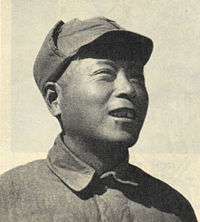Li Jingquan
| Li Jingquan | |
|---|---|
| 李井泉 | |
 | |
| First Secretary of Sichuan | |
|
In office September 1952 – February 1965 | |
| Succeeded by | Liao Zhigao |
| Personal details | |
| Born |
1908 Huichang, Jiangxi, China |
| Died | 1989 |
| Political party | Communist Party of China |
| Spouse(s) | Xiao Li |
| Children | 1 |
| Li Jingquan | |||||||||
| Chinese | 李井泉 | ||||||||
|---|---|---|---|---|---|---|---|---|---|
| |||||||||
Li Jingquan (November 1, 1909 - April 24, 1989) was a Chinese politician and the first Party Committee Secretary of Sichuan following the establishment of the People's Republic of China in 1949. Li was born into a landlord's family in Huichang County, Jiangxi in 1908. He began studying Marxist theory in his youth, joined the Communist Youth League in 1927, and became a full member of the Communist Party of China in 1930. During the 1930s, Li served as a political commissar in the Red Army, and participated in the Long March. During the Second Sino-Japanese War, Li commanded the military actions against the Japanese invasion in the northwest of China, included in Mongolia and Shanxi. In 1949, working with He Long, Liu Bocheng, and Deng Xiaoping, Li commanded his troops to occupy all of Sichuan province.[1]
After the founding of the People's Republic of China, Li became one of the dominant political figures in Sichuan. He led agrarian reform in the province in 1950, and the establishment of socialist cooperatives in 1955. However, after Mao Zedong launched the Anti-Rightist Movement in 1957, Li became more radical, persecuting more than 50,000 "bourgeoisie rightist" elements, which represented 10% of the rightists persecuted nationwide during the movement. From 1958 to 1961, he participated enthusiastically in the Great Leap Forward movement. Li's radical policies created major food shortages in Sichuan, leading to the deaths of over 8 million people from starvation according to official statistics. In 1961, Li was made Party Secretary of the Southwestern Bureau of China, and retained his position as Party Secretary of Sichuan province.[1]
During the Cultural Revolution, Li was branded an enemy of the Party, relieved of all political and administrative positions, and imprisoned. He was released in 1972 and rehabilitated in 1973. Following the Cultural Revolution, Li served as a Vice-Chairman of the Standing Committee of the National People's Congress and as a member of the 10th and 11th Central Committee of the Communist Party of China.[1]
Personal life
Li's wife Xiao Li was tortured during the Cultural Revolution and committed suicide. His son, a student at the Beijing Institute of Aeronautics and Astronautics was also killed.[1]